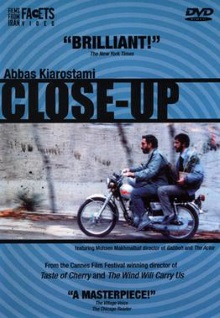
This is the only the third film we’ve watched by legendary Iranian director Abbas Kiarostami and it’s his earliest one yet. This film seems to have helped establish the director’s reputation in the west though it was panned in Iran itself. It’s based on a real event with all of the main people involved playing themselves though understandably most scenes are reenactments.
A journalist brings a couple of policemen to arrest an alleged conman and write about the story. A poor man Hossain Sabzian has passed himself off as the famous Iranian director Mohsen Makhmalbaf to a family of some wealth, the Ahankhahs. He has borrowed some money from them and led them to believe that he would use their house to shoot his latest film and use one of their sons as the lead actor. After Sabzian is arrested and the story published, Kiarostami hears of the situation and decides to make a film out of it. He obtains permission to interview Sabzian in prison and to film the trial. Though the amount of money involved in the fraud is negligible, the trial is interesting as everyone tries to understand why Sabzian impersonated a famous director and how far he would have been willing to go.
Not knowing anything about the real-life event beforehand, we were certainly dumbfounded by the situation. At first we were even confused by whether or not Sabzian really is Makhmalbaf as he keeps insisting that it only looks like he is committing a fraud from the outside. The reenactments of Sabzian’s encounters with the Ahankhah family makes things clearer and I find it so satisfying that Kiarostami goes all the way and shows Sabzian’s arrest. The way that the head of the Ahankhah family is unfailingly polite and keeps up the pretence up until the very end is delicious and I loved how his wife says to at least let him finish his lunch as the police lead his away. The main draw of course is the intimate portrait that it paints of Sabzian’s mindset. This is after a poor, ordinary working class man with no prospects who nevertheless loves art and finds escape in cinema. He identifies strongly with the films he watches and having been mistaken for Makhmalbaf discovers a strong sense of power and self-worth in being a figure who is widely respected and whose words are listened to. Eventually he even convinces himself that he’s doing it for the family as well as they feel empowered in being involved in an important project. It makes for a truly fascinating psychological study.
I’m less enamored of the film’s attempts to muddy the waters between what is real and spontaneous and what are planned reenactments. I found it rather implausible that the judge would allow Kiarostami to film the trial but even pose his own questions to the people involved there but this appears to be legitimate. Other times the film plays games with the quality of the video and the sound but I’m convinced that they could always have a high quality production if they wanted to so the amateurish quality at times is only an affectation. The intent is obviously to add an extra dose of authenticity to the film but I found it artificial and distracting. For example, Kiarostami is clearly involved in everything, not just a director behind the camera so why is he so shy about showing himself in the frame?
Overall I found this to be a cleverly conceived film and insightful film even if Kiarostami was lucky enough to have Sabzian do most of the work for him. It’s a wonderful portrait of why someone would choose to pretend to be another person as a means to escape his own dreary life and even better for Kiarostami the man happens to be a huge film buff who constantly cites scenes and characters from Iranian cinema.